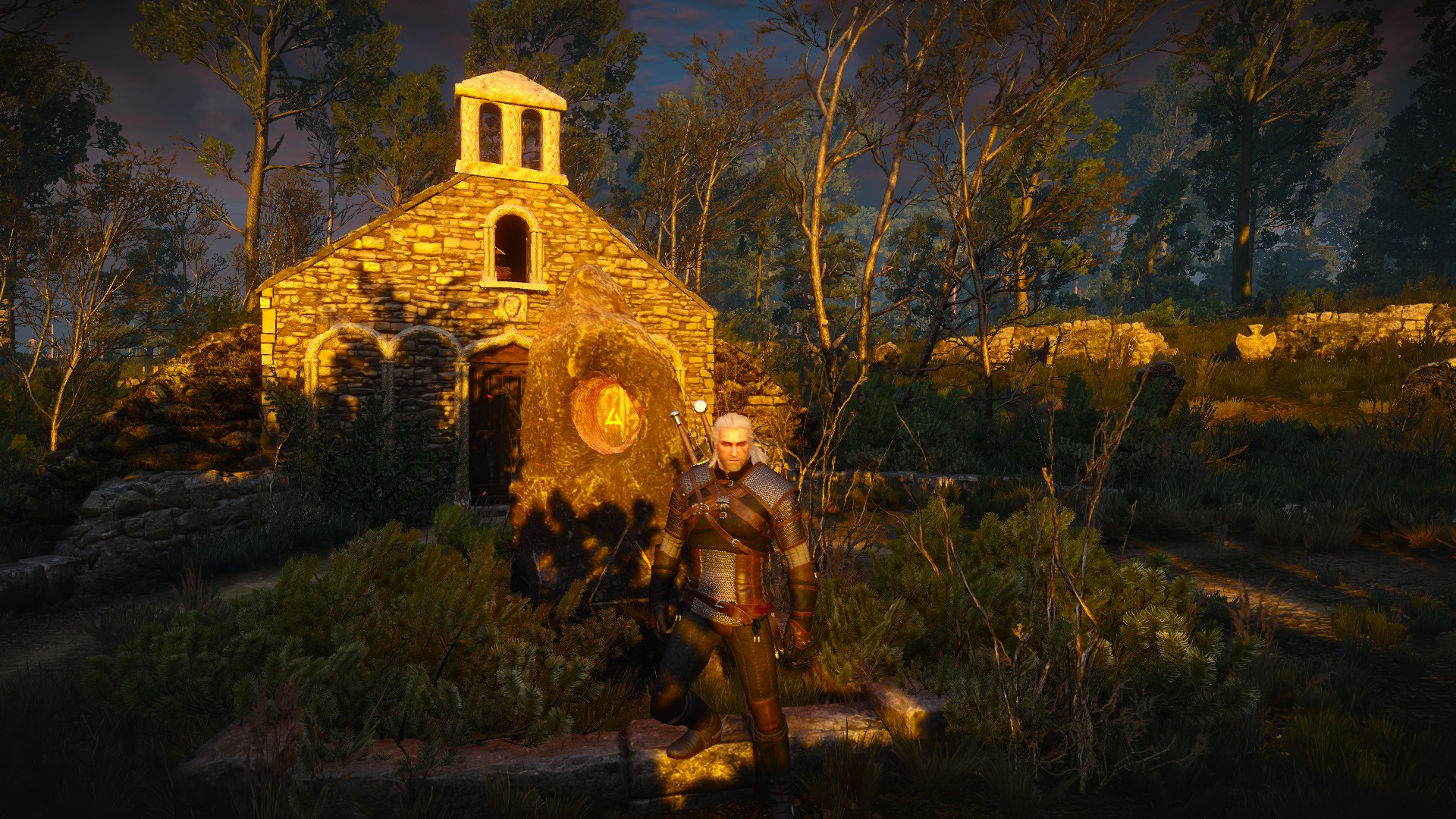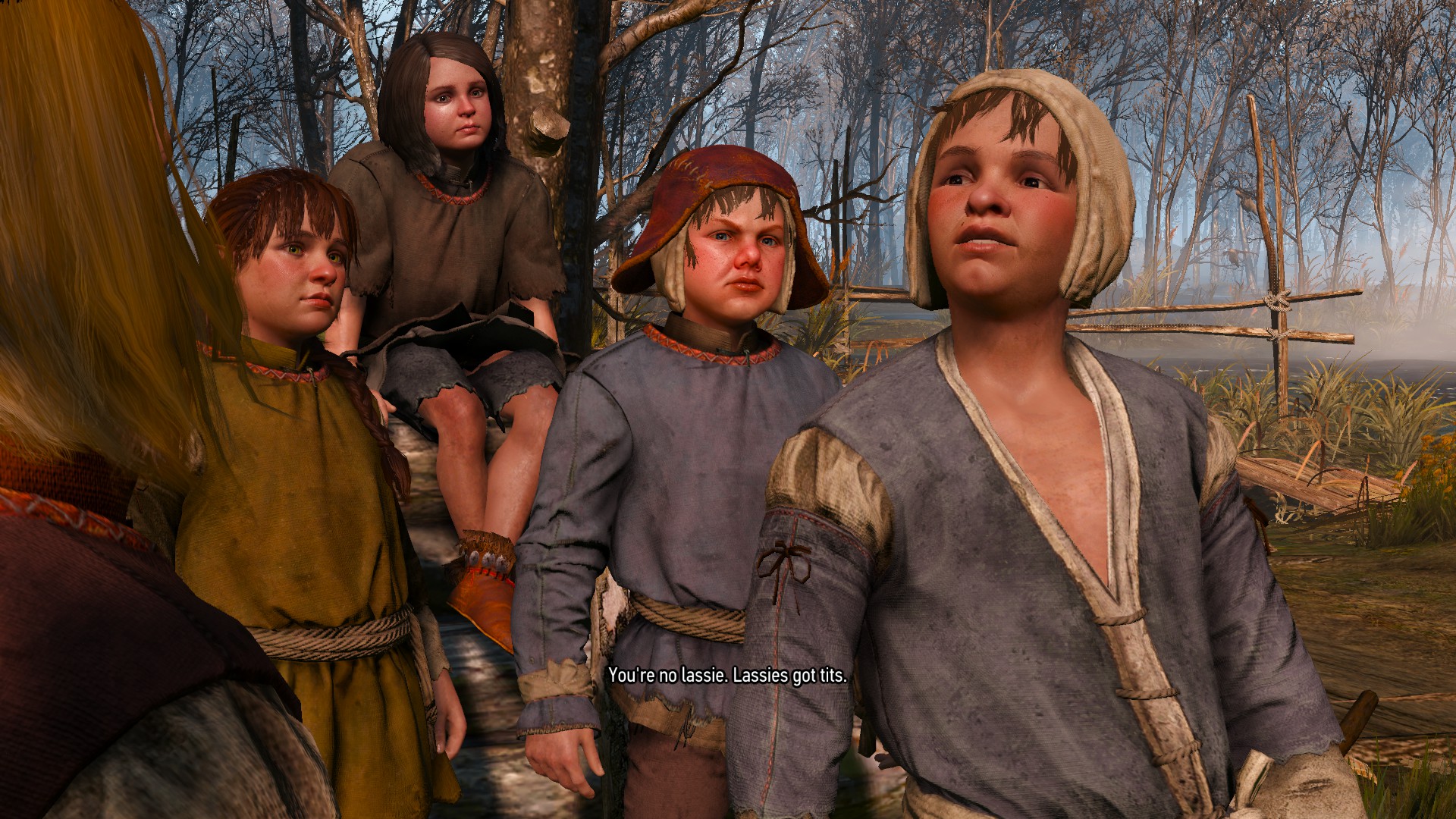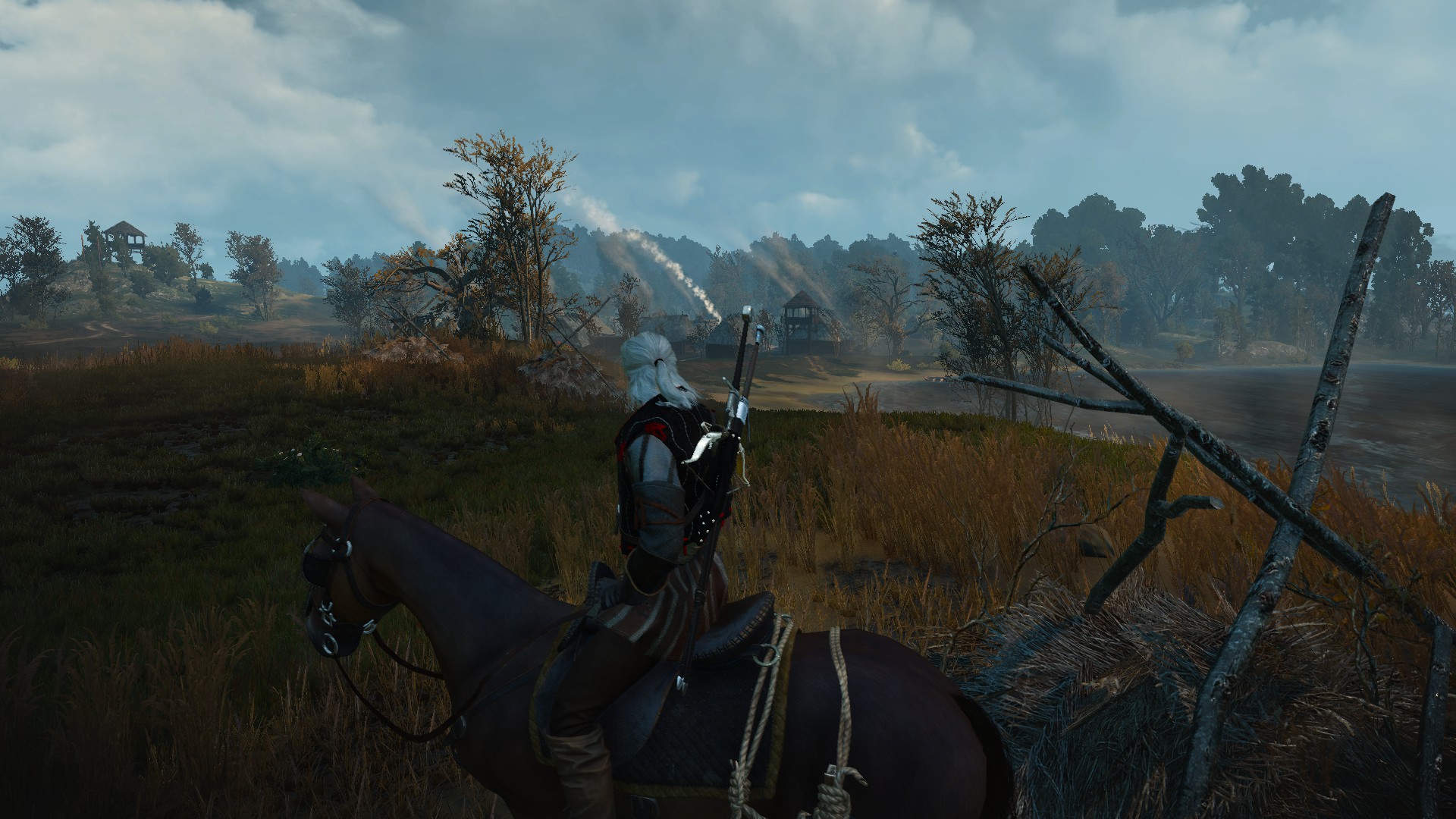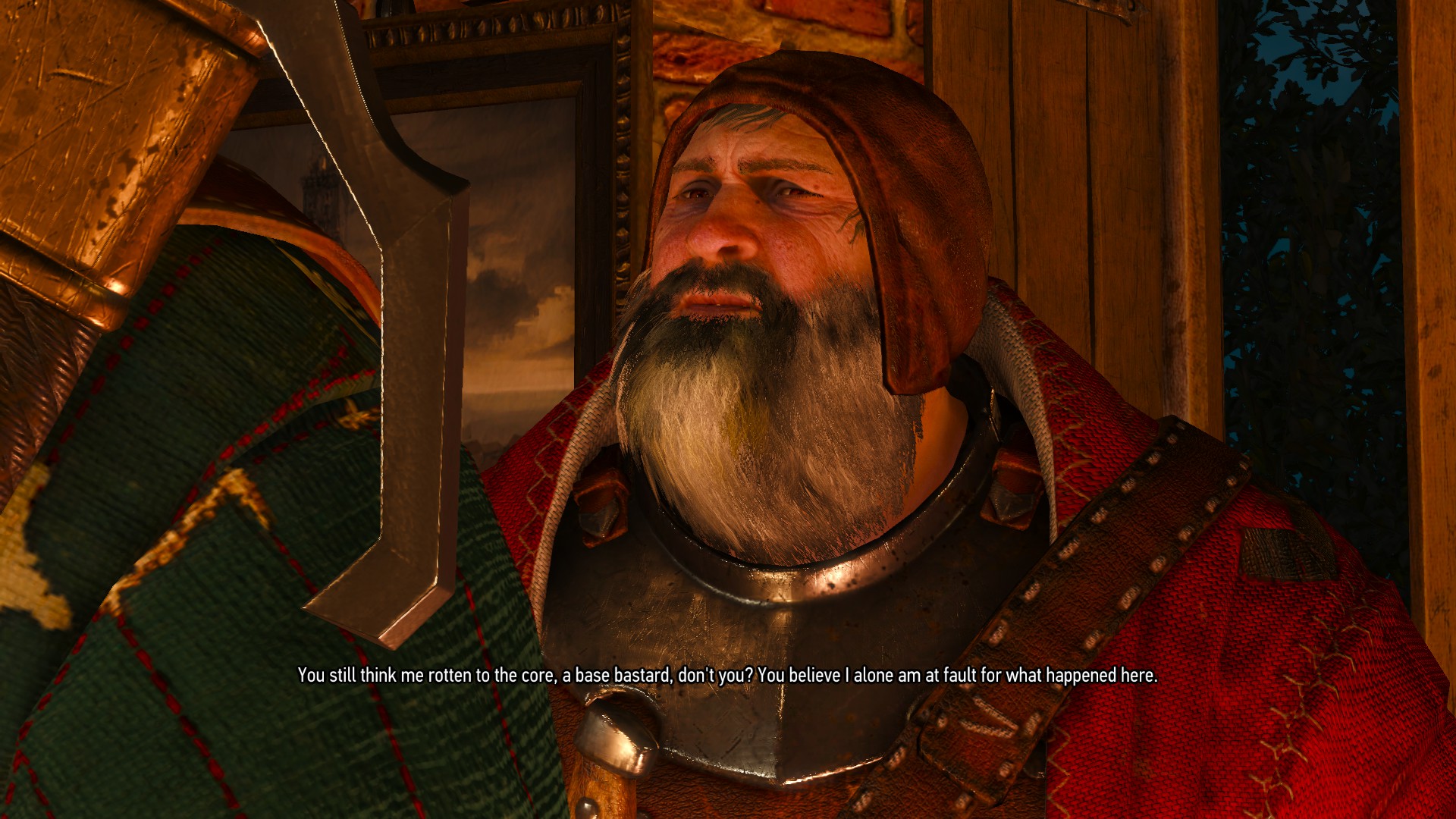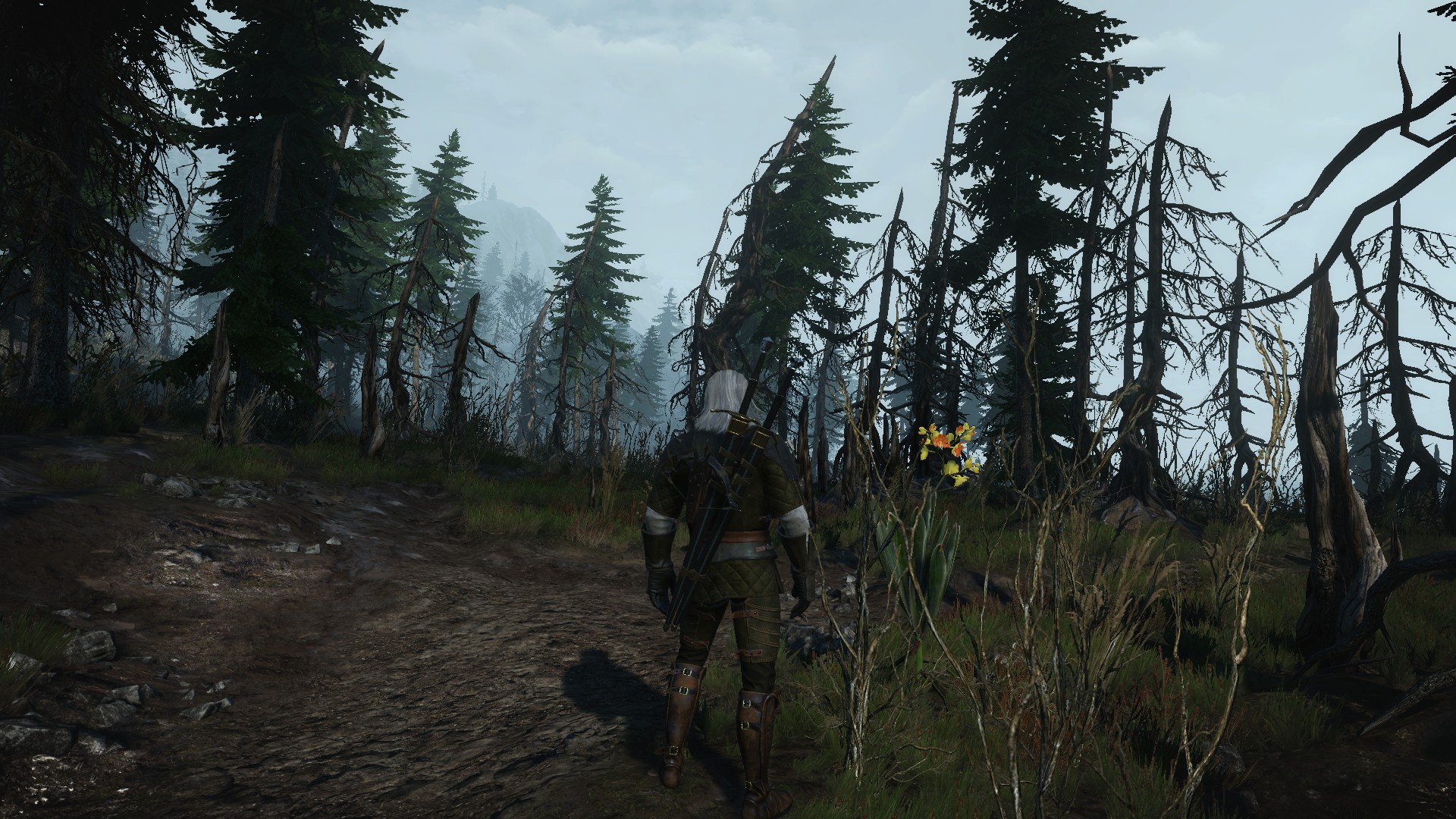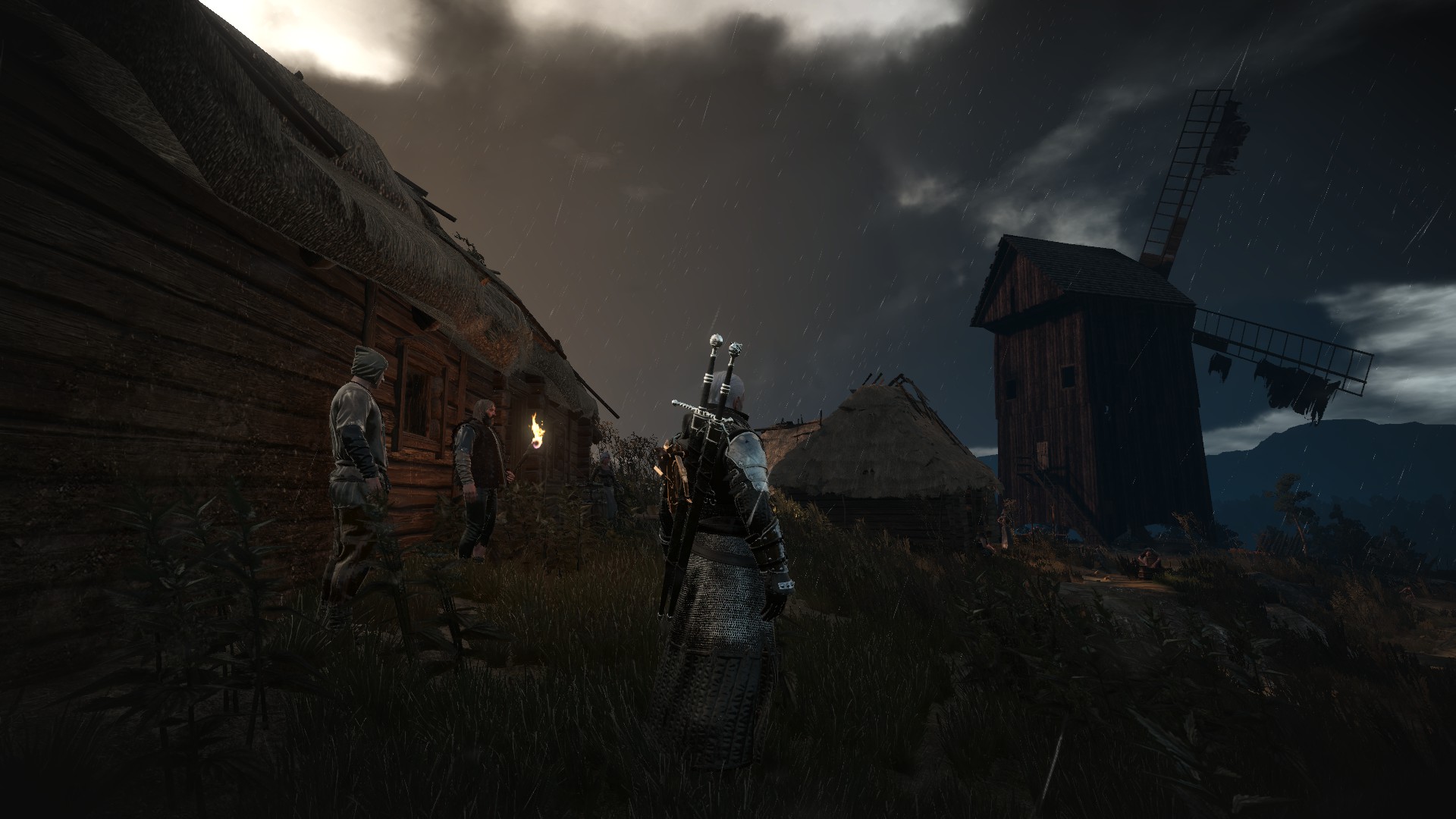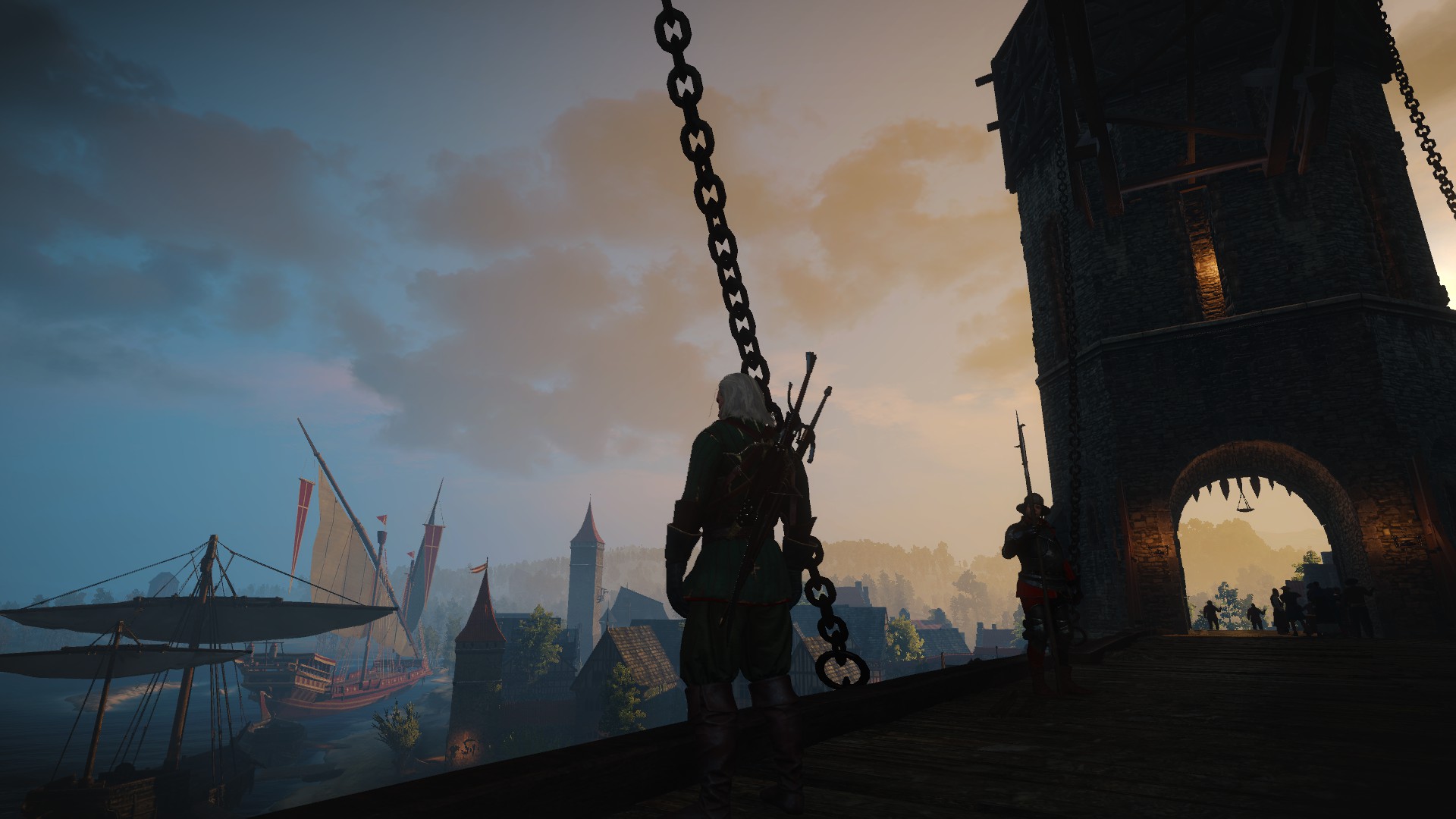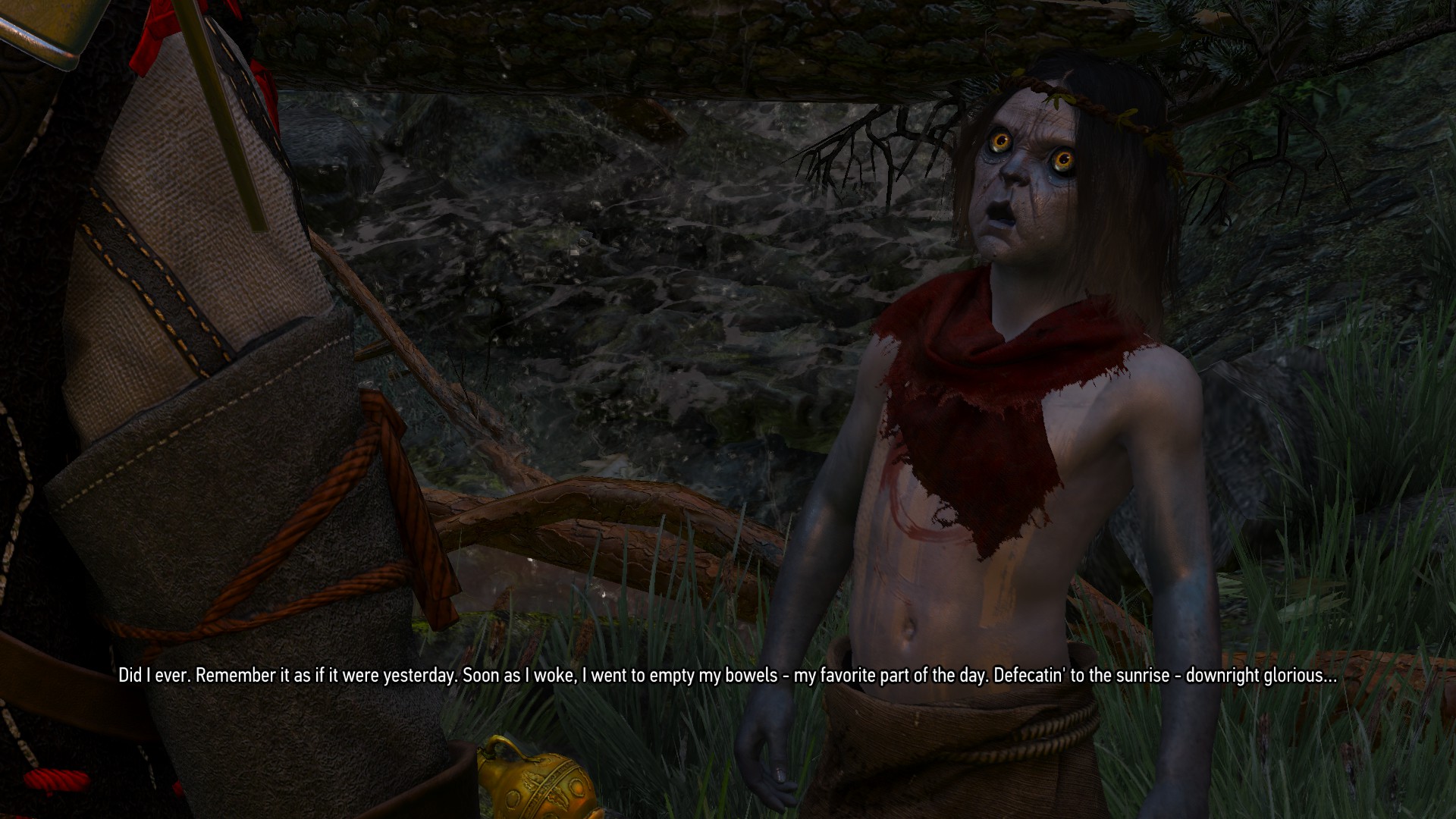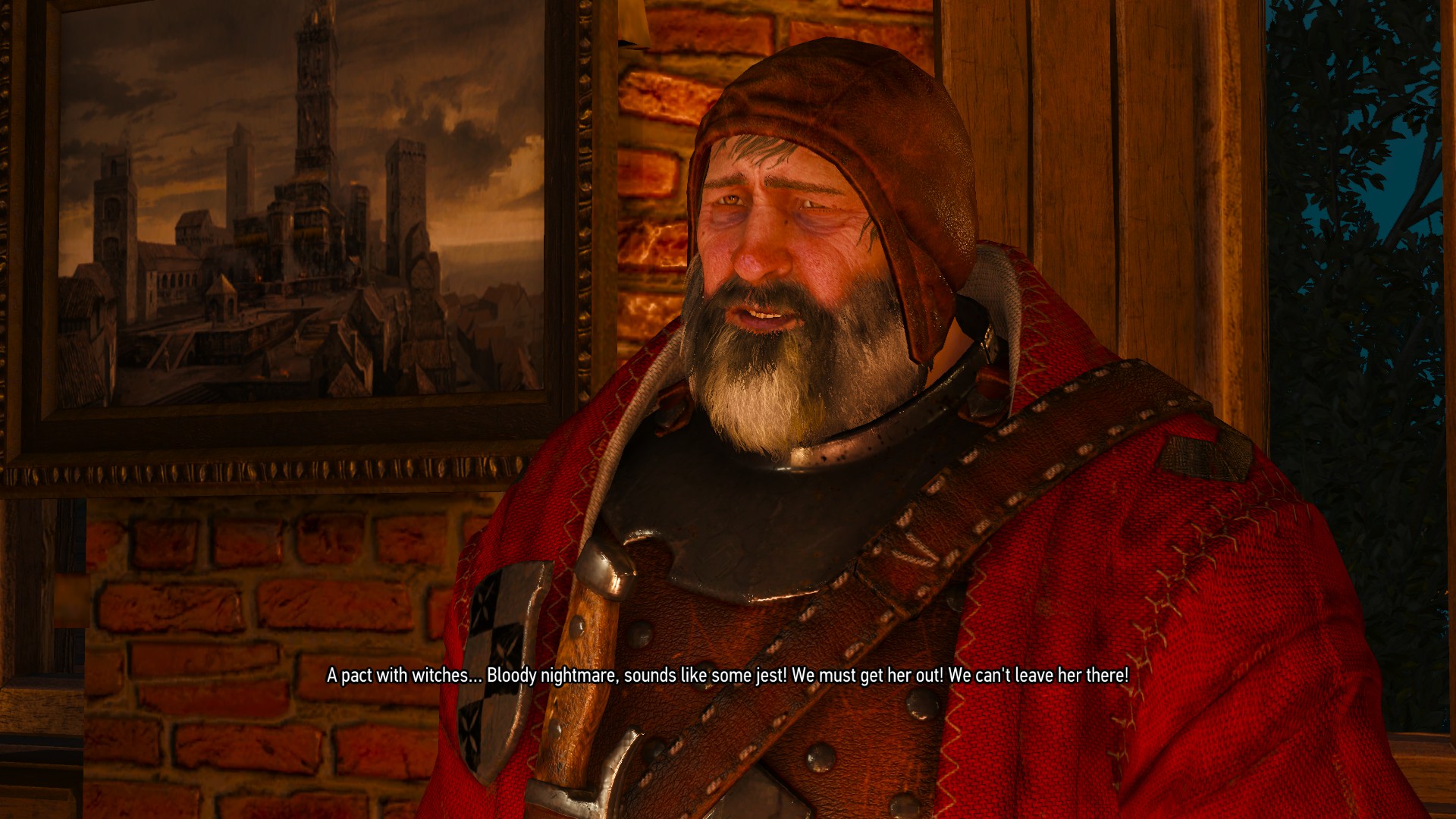Recent Posts
Why the Witcher 3 is Good
3. May, 2016
What follows is not a review, not least because everyone who would care about reviews a year after the game's release has probably read them, and if not you may as well just go to [generic game magazine] and read theirs. Instead, I'm going to start from the point I arrived at while playing, which is that The Witcher 3 is probably the best single-player game I've ever played, and I therefore need to put that feeling into words and preserve them somewhere before I succumb to my own fanboyism and, I dunno, start bleaching and dyeing my hair Geralt-grey.
I should probably prefix this all with a caveat that I don't play that many story-driven games or RPGs, so it may be the case that a hundred other games did all or most of these things far better than TW3 does. (Feel free to make recommendations in that case). Still I don't think this is the case because so many big-name titles (ahem, Bethesda) fail on these counts, and because what I've heard from friends is so much more positive about this game than with others. And hey, it won Game of the Year for a reason.
Basically I want to examine all the reasons that made this game a success for me, why it left me feeling somehow adrift, a little... bereft after finishing it, having been drawn so wholly into the world the game constructs that I'd almost accepted it on some level as being real, as if its characters were important enough to feel real emotions for, as if, now I was wrenched back into reality, sitting on a sore bum in the same chair I'd been sitting for hours, something was now missing from my life.
It's the same feeling one can experience at the end of a fantastic novel or particularly moving film, and it only happens when whatever it was was so well made, so absorbing that it suppresses real life a little, takes over and sneaks in to your mind to the point where the realisation that it's now over is a genuine surprise, because how can something so real simply end?
Before I go further, a word on spoilers: I've tried to keep them to a minimum, but some inevitably remain. In particular, there is one pretty big point which is impossible not to spoil indirectly if one is to say anything about some parts of the game (this happened to me, as a matter of fact—if you've heard much about the game it may have happened to you too, without your knowledge). So, if you're going to play the game soon and want to keep your mind a perfect tabula rasa, it's probably best to stop reading; on the other hand if you're not going to play it at all, or not for a while, or if you don't mind a few indirect spoilers and allusions, read on. The more major spoilers I felt compelled to include are indicated; click to reveal them.
Bad aspects
First of all, I need to mention some things that weren't so good. This probably seems a bit weird considering my gushing opening paragraphs, but there's method in the madness. I'm going to say them first to get them out of the way, because I want to then be able to run away with an almost uninterrupted stream of disgustingly positive writing. I'm going to say them at all because they're pretty important: the game isn't perfect by any means, but almost all its imperfections lie in the gameplay. You'd think this would be the worst possible place for a game to have flaws, but the experience you have playing this game is rooted much more firmly in the story. In any case what you should take away is that these flaws do not detract from that experience.
The combat is very fun in Witcher: satisfying, fluid, skillful... but balanced it is not. If you start the game on a hard difficulty, you will be being shat on by every pack of level 1 wolves you come across. The first fight with a bunch of ghouls when you barely even know the controls is almost impossible; I think I had to try ten times to get through it. Even after managing a tough fight, you might come out with so little health and a marked lack of food or potions to restore it. You die. A lot. Discretion may be the better part of valour, but it's too extreme. Then, once you're level 20 or so, though, have levelled up your gear and, crucially, advanced and equipped some skills, you can more or less take on anything except the toughest bosses without breaking a sweat. Even enemies that out-level you significantly will fall because you'll have enough interruption, damage or defence to push through. This is a major problem.
On the other side of the coin, you sometimes come up against a critter who is just not susceptible to your particular build or strategy. Most bosses are immune to a lot of your "disruption" abilities—they won't stop attacking if you set them on fire or try to mind control them, for instance. If your strategy relies on something like this, you might find yourself for an unfairly tough battle.
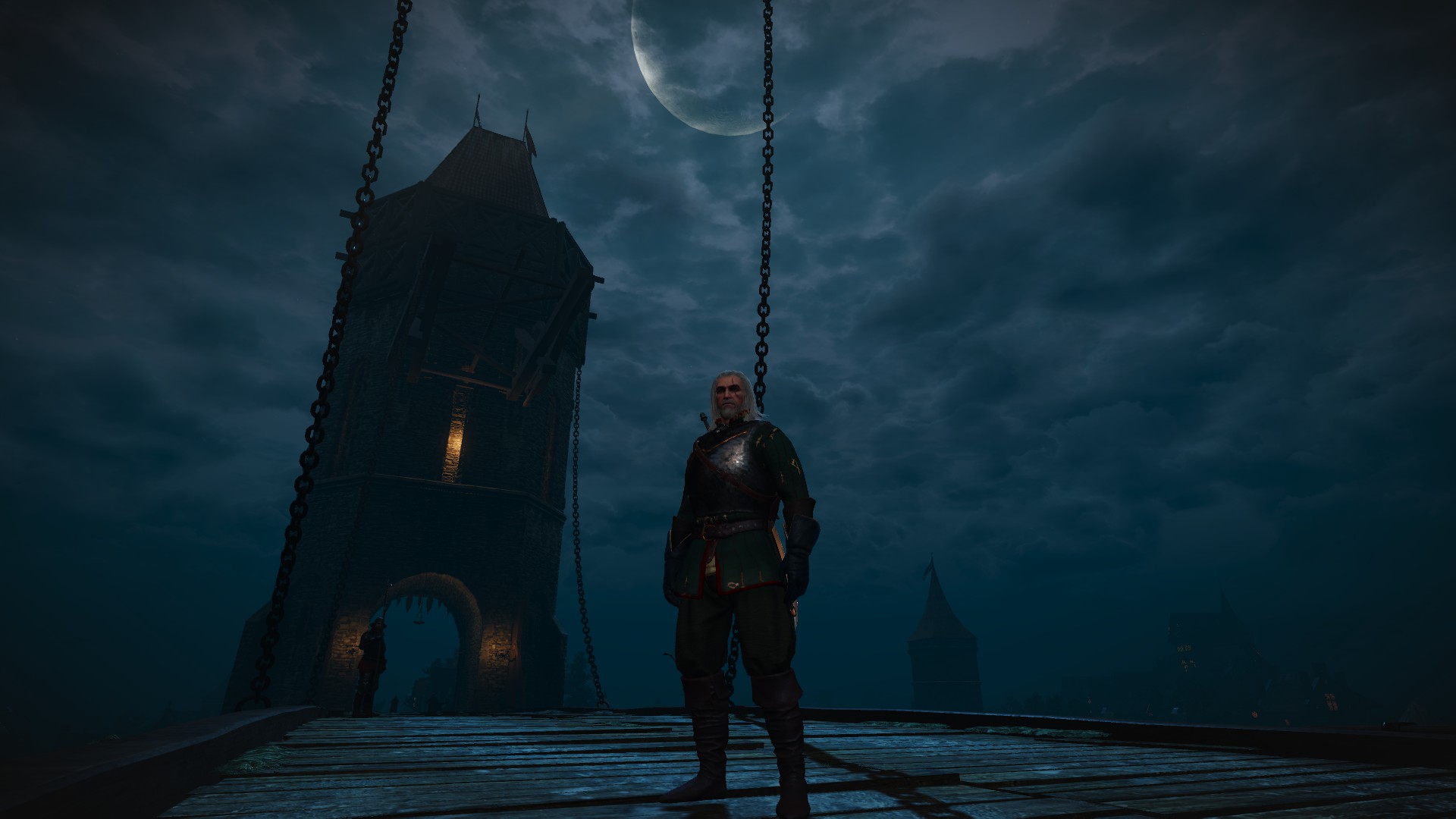
Your reward for these Herculean victories is invariably meagre: loot is lacklustre at best, and there's simply no reason for it to be. Most booty is just sold for cash since the best equipment is generally stuff you make yourself from special Witcher Diagrams, and everything else is basically just ingredients and minor buffs to your gear called runestones. You'll have enough of these to write a good-sized saga by the end of the game. This is exacerbated by the fact that potions and bombs never run out—you just meditate and, I presume, distill alcohol into sword-damage-juice in your urine, refilling your supply. This leaves the real scores as diagrams themselves, which enable you to brew more and better potions, and upgrade your swords and armour. But these are never dropped by enemies—they're found in specific locations and shops—so there's little reason to actually kill enemies, except for surrogate cash in the form of monster brains. Even your reward for completing contracts is a little measly (not enough to forge one of those shiny sets of armour, anyway) compared to selling your entire saddlebag full of rusty swords and ham sandwiches looted from the local bandits. Beside that, killing monsters gives you next to no experience points, so it doesn't level you up, either.
The whole levelling business is a bit weird, anyway. You gain most experience by doing quests—some questlines will advance you several levels on their own. But each quest has a recommended level, and doing it too late (more than 5 levels higher) will mean you earn about 2 XP from it. That's not an exaggeration: each objective completed might be worth just 1 XP. This isn't that big of a deal, and prevents you from overlevelling too much in a game where you end up the boss of everything anyway, but a traditional XP system where monsters and quests give you a fixed amount, but you need more and more to advance to the next level, would seem to soften the blow.
While doing these quests there is a bit of an over-reliance on the SpideyWitcher Senses doodad, too. This thing highlights all the interesting things nearby—not an inherently bad way of representing Geralt's supernatural senses, but probably fully 50% of objectives start with, "Use your Witcher Senses to..." and it gets a bit much. To be fair, it's very good that the game includes a style of objective other than, "kill this beastie," and "retrieve this trinket," or "talk to this dude," but nevertheless an alternative should have been found.
While using your super-smell, you can see what containers have stuff inside them, and where that cockatrice dropped his brain and other valuable body parts, which is definitely neat. However, trying to navigate to those delicious cockatrice craniums is sometimes frustrating, as Geralt always walks a little way in his current direction before turning to the direction commanded. If you're facing away from a monster drop, you can't pick it up, but if you try to turn towards it you'll likely end up facing a different kind of wrong direction, due to moving.
Other minor irritations are the various repeated elements: many NPCs share the same face, for instance—this is only so irritating because the faces are so detailed and varied that you can spot when it's been reused and covered up with a different moustache. At least each NPC with a cutscene could have been giving a unique face, though. Presumably this is a matter of the amount of work required to make models, textures and animations for every single face—their being so detailed must amplify that a lot. The conversations you overhear play every time you walk past an NPC—aka Nazeem Syndrome. You'll learn to hate that kid who sings "Emperor Emhyr is snoring" before you leave White Orchard. Finally, while the animations are all impeccably done, some of the conversational animations, particularly hand gestures, are just played way too often. You get to recognise that weird "I'm explaining something big" gesture coming from a mile off.
The Rest
Story-telling
The most important strength of TW3 is its story-telling. You rarely get a story so engaging and complex, never mind in a video game, but in most films. In a way, this is unsurprising: a two-to-three-hour film cannot hope to convey such a complex story as can be told on your journey through a hundred hours of gameplay, even with a lion's share of that play taken up drinking up the gorgeous landscape you must ride across, and slaying the monsters you're paid to deal with.
But while time is a key advantage that a game has when telling a story, any gamer knows that most games have simple stories that are enough to hang the mechanics on, but in the end is just like so much washing line.
One of the first aspects of TW3's strength you encounter is the structure of its main quest. You are searching for your adoptive daughter, Ciri, who also happens to be sought by a whole bunch of other people (she's very special due to her birth and blood, you see). There's nothing special here, but as the story advances, you are given the information you ask for by the people you meet, and each time another piece of the history of her journey through the land is revealed, you get to experience it first-hand, playing as Ciri.
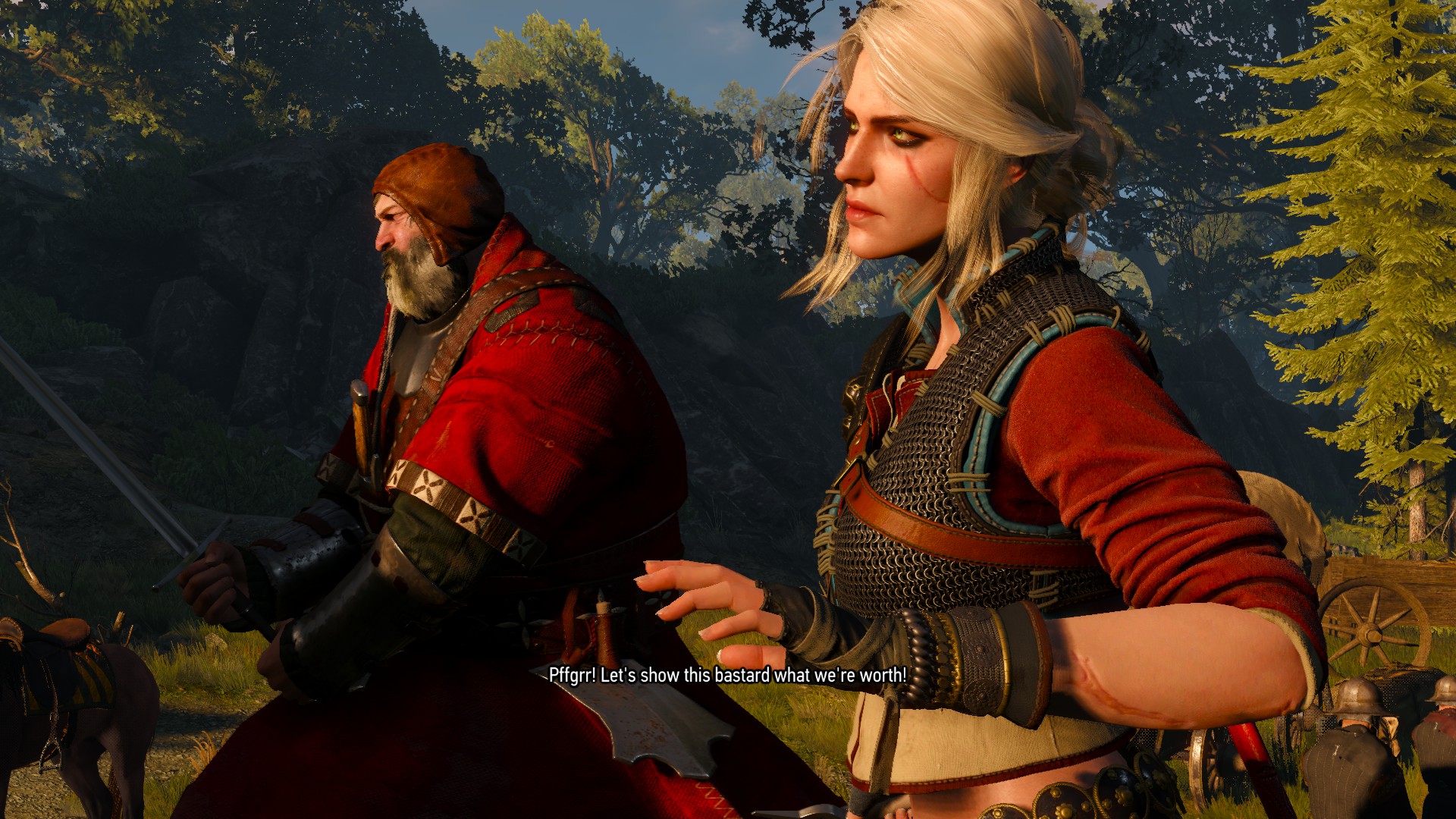
This provides some exciting gameplay variation because Ciri's abilities are very different from Geralt's, but for the story, this attunes you to Geralt's mentality: it is clear he cares very deeply about his ward, and so for him, when someone is telling him of the dangers she faced, it's as if he is reliving them himself.
This is crucial because the success of the story depends on you caring about its characters in a way I rarely do in any work of fiction. Interactivity is key, here: you play to be Geralt, making his decisions, choosing his words and actions. This moves you to think more like him, to care about the things he cares about. Time is important again: it's difficult to grow to care about a fictional character, but it's harder still if you only have a couple of hours to get to know them. But then, with characters like this game has, maybe this is less of an issue. Ciri's mixture of strength together with her relative lack of experience makes for a delicate balance: you want to help her as a daughter in need, but not to be over-protective of someone who knows she is powerful, who needs to be allowed to become fully independent.
This comes to a head when you finally find Ciri. And she's dead. Or rather, she appears to be—she is revived by a fairy light thing, but not before Geralt has collapsed, head in hands, and is crying into her lifeless shoulder. The whole sequence is beautiful, painfully beautiful. The only issue here is that this is the point which is so easy to indirectly spoil—any mention of Geralt doing anything with Ciri implies that she must live beyond the point at which you find her.
The game abounds, though, with people to care about. The story of the Bloody Baron is a tragic and complex such person: a deeply flawed man whose friendliness can't hide his terrible faults, yet whose situation begs for sympathy. Your various love-interests all have their own strengths and resolve, yet are vulnerable in their desire for intimacy and human contact; the interaction of their own agendas with Geralt's desire to get laid makes for a humorous ballet, that always ends up feeling somehow comfortable, which is an aspect of real relationships often missing from fictional representations. Triss, an old flame (literally—her preferred offensive spell is the classic fireball) but since apparently spurned by Geralt, clearly misses him. How you treat her affects several other interactions down the line, but what's clearer is your desire as a player to treat her kindly and not cause more suffering. How you do this (or if you don't, and rub it all in her face) is up to you.
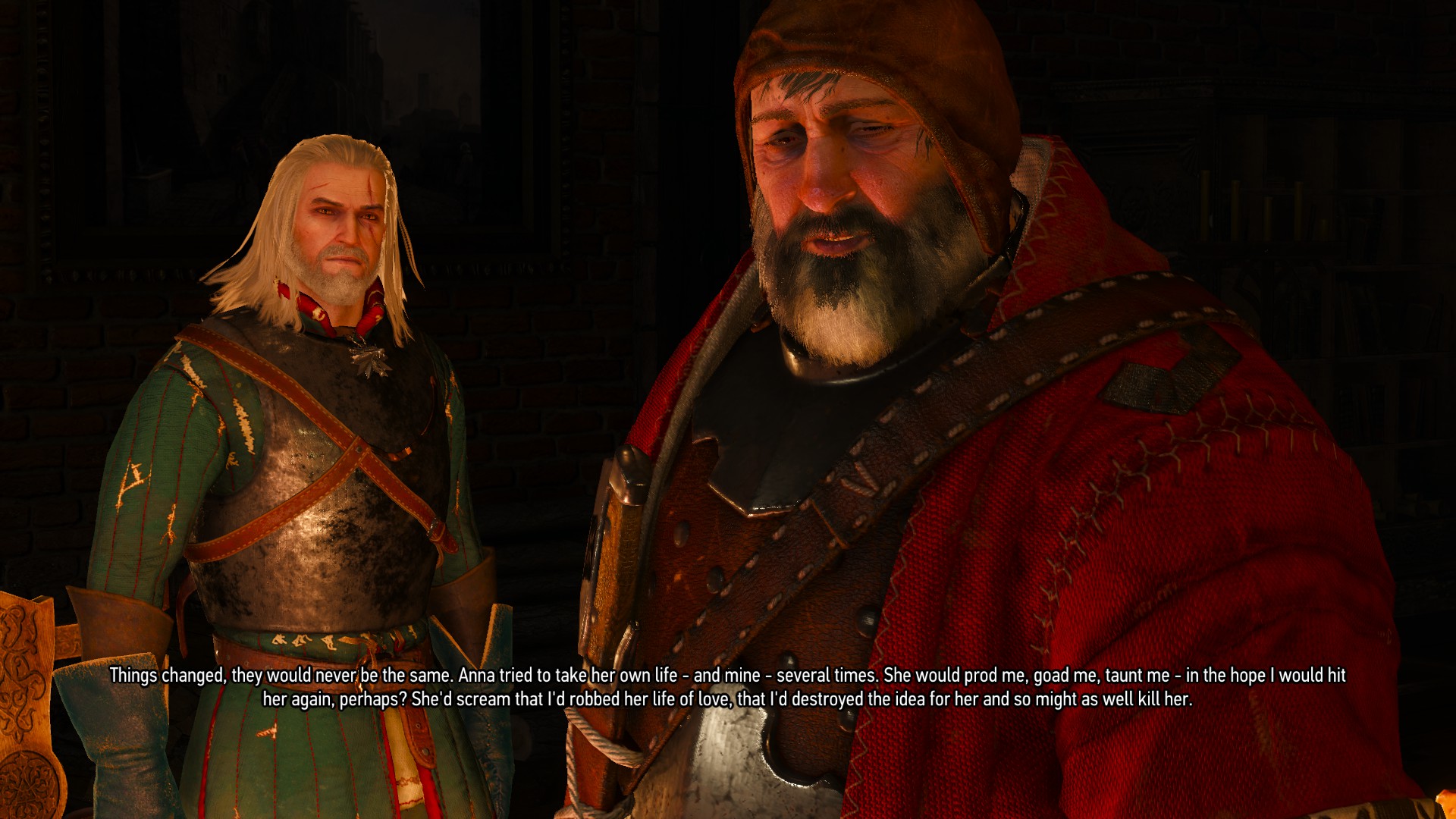
In all of these developing stories and relationships, the writing is impeccable. In contrast to some of the overheard NPC-conversations, the dialogue never sounds off or unrealistic, and you never pick a dialogue option only to realise what you actually say was totally ridiculous. In fact, the opposite is true: the options are designed to make it clear what choice you're making or expressing, but what you actually say often bears no resemblance to the option (to the extent that sometimes you say nothing) yet this not once goes wrong. You can trust Geralt to say something good, evenespecially if you always choose the most sarcastic option. (Sarcasm is frequently an option: you should definitely always pick it; it will definitely 100% never go wrong. Well, it will never go boring.)
Layered on top of this is absolutely fantastic voice acting. The main characters aren't even the stars, here, though I was pleasantly surprised that Geralt avoids the Surly American Hero stereotype to a degree—the sensitivity in his voice when talking to children or scared creatures prevents this. But there's the aforementioned baron, whose gruff Liverpudlian baritone perfectly matches his outward appearance as a large, tough leader who loves a drink and a fist-fight. We are therefore all the more off-guard when his sins and melancholy are revealed. Keira Metz is an old sorceress friend of Geralt's, whose voice carries a fantastic tinge of haughty command alongside a mischievous humour and affection. Then there's Avallac'h, a character you don't meet until much later, whose motives are unclear but whom you nevertheless need to trust. His voice is the essence of calm—assured in himself and his task. I don't really have anything to say character-wise, but his voice is so rich, I could listen to it all day even if he were reading party-political broadcasts for the BNP. The only niggle with the voice acting is a perennial one: when a character cuts another off there is always a small but noticeable pause where one sound stops playing and the other begins. Obviously voice actors are recorded in isolation but you'd think games would be able to fix this by now!
All these voice actors are chosen with a variety of accents that warms the cockles of my soured, English heart. It wasn't until I started watching Game of Thrones that I realised I missed hearing British accents in my blockbuster TV shows, and with TW3 the same feeling of slightly-embarrassed (because really I should be able to enjoy a film, show or game just as much regardless of where the voices come from, right?) glee to realise that they not only have English accents, not only Received Pronunciation, no! They also have voice actors (or accents) from Liverpool, Yorkshire, Wales, Scotland, Ireland (I think both Republic and Northern), the West Country, the South-East and probably other places besides. While this did lead to one rather sad interaction with an art collector in an auction house—the speed with which he switched from West Country to Yorkshire potentially having ramifications for British cross-country rail operators—pretty much everyone else is flawless.
But that is a rather personal and secondary consideration. Returning to more sensible things, the acting in general represents a major milestone in gaming. The character animation and directing is (with exception of some of those weird hand gestures) incredibly well done and, above all, subtle. This is the first time I noticed characters in a game actually exchange glances, for example—wordless, meaningful looks. They might smirk, or roll their eyes, or grimace, or convey any emotion. Pay attention, Bethesda: it's no longer enough for characters to stare at you, gormlessly relating the awful loss of her family with an expression you might have if you zoned out while watching a particularly unexciting episode of Countdown. In Witcher it's there and it makes a massive difference in the amount of emotion you feel from a scene. Correspondingly it allows you to engage with those characters on a much deeper level, just as you can when watching a well-acted film, but with all the advantages the game and its format bring. Of course, it's not on the level of real actors just yet, but games are getting there, and game developers are very definitely aware.
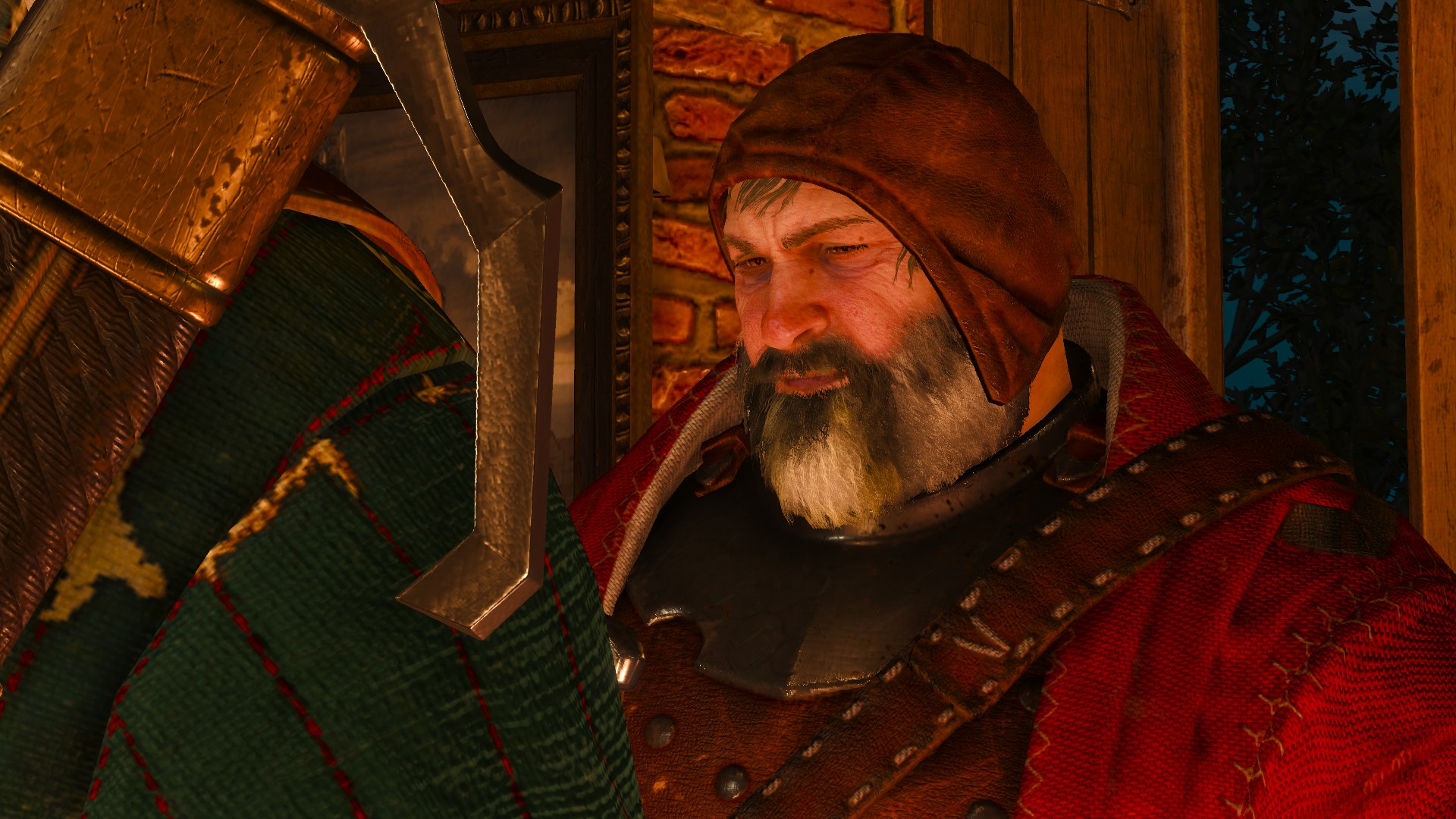
One example of fantastic acting occurs when you can choose to let Ciri vent her anger—in fact one of the cases where a dialogue option leads to you saying nothing. If you take this option, Geralt pretends to read some bits of paper, while deliberately knocking a bottle off the desk, smashing it. He pretends to have done it by accident, but he and Ciri share a look and she starts to smile—then mimics his "accidental" violence, and chaos ensues, all while Yennefer observes, trying to look disapproving.
Engagement
The success of the story-telling leans in no small part on your engagement to the story by giving you interesting things to do and see through quests. This is something that the Witcher series is famed for, and it does not disappoint: on multiple occasions, I just gaped at the screen at what had unfolded, or grimaced as I had to make some awful choice.
An over-arching theme of the game is choosing the lesser of two evils. In these quests, there is often no right answer: you can choose to assassinate a king or not—which is right? Which will cause less suffering? And later on can choose whether to stay true to an idealist ally, or side with someone who sold out your cause for a negotiated peace—the same questions are just as hard to answer. Games have been able to let you choose between being a White Knight and an Evil Bastard for a long time, but it's much rarer that you have a decision which you can't just make based on your D&D character alignment. This is crucial, because it forces you to think about your choice then encourages you to live with it. You could just reload if something unexpected happens, but you're discouraged from doing so: after all, you made the choice for a reason, so it would be going back on your own principles which you used to reach your decision.
As the game progresses, you realise that the philosophy of the game is choices with consequences, too. In Tower Full of Mice what you do could result in an awful fate for one or more people, and it's not obvious what to do. But you know the rules of the game by this point, and so it seems fair, whatever outcome you get. The consequences you anticipate force you to consider your options carefully, to try to pick carefully—the game forces you to engage with it, by making you suffer a litany of death if you breeze along.
Many quests suffer from being part of a classic RPG-train of quid pro quo—you need to find Ciri, but the Baron won't tell you where she is unless you do something for him, but you can't do that without the help of Zoblog the Great, who wants you to fetch a MacGuffin, which... you get the picture. However, while this does sometimes get a bit tedious, it's averted to a large degree by involving tasks other than simply "fetch this bauble" or "kill ten rats skeevers ghouls." Often your task is to tell someone something, or ask them about something, or look for someone—tasks which seem a little less shoehorned into the framework of the game than your classic Skyrim, "if you want me to do this for you, please help me by going into this dungeon and killing some draugr."
To a large extent, the fact that you care about the characters means you care about the outcomes of the quests, too—so you want to help Triss rescue her mage friends, and you're equally motivated to work out with Yen whether your mutual attraction is natural or the product of magical interference. It matters little if you're being sent from pillar to post (from Pellar to... Goat?) if you actually care about the consequences of going to those particular architectural features. These two quests are not in the main questline and are entirely optional—but they cry for your attention nonetheless. They have big consequences for the characters involved, and increase your understanding of and attachment to them.
Many quests in TW3 require no combat and even less interaction: they're basically cutscenes with intermissions to keep you awake. But this is completely unnecessary, because you're generally glued to the screen watching events unfold in rapt attention. Any dribbling on your keyboard is because you're gaping at what happened, not because you've dozed off. A notable example is Va Fail Elaine, where an event that's been building for ages finally pays off and you get some concrete progress. All you have to do is watch and listen (to a panicked maybe-human creature essentially being tortured) and administer three potions.
Art
Some people like to debate whether video games are art (or, perhaps, "Art.") I find this a weird debate because it seems so obvious to me that they are. Nevertheless, many games are not very good art.
TW3 is very good art. As a work of fiction it is complex, nuanced, and draws you in more effectively than any film or book because of the nature of the medium, well-executed. As a piece of visual art, it is impeccable: for a while, now, computer games have been capable of producing such beautiful vistas as to rival any real landscape. When the sun is setting in White Orchard, or rising through early-morning rain on Ard Skellig, one is moved to pause from the tawdry business of hunting monsters, from the humdrum of rescuing your lost and only daughter to take in the beauty and atmosphere.
Remaining visual, this is the first game where I've actually noticed the camera in a positive way. Most of the time in a game when you notice the camera, it's because it got stuck in a wall, or is helpfully staring up your arse instead of giving you a view of whatever flying beastie is trying to relieve you of your limbs. Not here: every significant piece of dialogue has the camera move around as if directed by a proper cinematographer. Probably it was. The angles, cuts and pans all contribute to the telling of the story just as they do in a quality film production.
The animations don't just add to the acting and realism of the characters, but to the impact of the game visually: significant boss-battles end a bit before you actually deplete their vitality; the last few strikes are out of your control but brutally and beautifully choreographed. Your rage at defeating someone who would harm Ciri is palpable and gruesomely rendered, your desperation in dispatching a closely-matched foe is stark. The gameplay animations are themselves excellently done: Geralt is nimble on his feet, dodging deftly, at your command, to the side of blows, leaving him in position for an attack at an opponent's undefended back or side—fluidly transitioning from defence to offence. This lends combat itself its own flowing beauty (in spite of problems mentioned above). Nevertheless, no in-game animation is as perfect or detailed as those custom-made for the cutscene at the end of the battle, and these are a welcome addition.
The music must be mentioned at this point. Game music is something that has been incredibly good for a while, TW3 being no exception. It's very gratifying that this aspect of games has reached this level, where it not only enhances the atmosphere while playing, but is well worth listening to on its own. Somehow I feel like game soundtracks are easily dismissible, since you rarely pay much attention while playing in most games, but this is frequently no longer the case.
One thing the soundtrack does suffer from is repetitivity: because each piece is tied to a particular location, you are very apt to hear the same tune repeated over and over, and no matter how beautiful a piece is at first, it begins to lose its charm when you've been wandering the Fields of Ard Skellig for a couple of hours hunting down harpies. This strong tie between situation and track is not without its benefits, though. Like all major locations, the village of White Orchard where you start the game has its particular music, but due to its nature as a bit of a training zone, you can easily not return after you leave. At one point I returned there, hunting for alchemical ingredients (Arenaria grows there in abundance, and you need a lot of it for advanced potions) and the music immediately recalled those first hours of gameplay, first forays into the world, first battles and victories.
Likewise, the driving, whirling motif of the Ladies of the Woods instantly recalls their twisted likenesses and disturbing movements; the gorgeous, soaring notes heard on Skellige call on memories of wide fields and plunging cliffs; while the thumping, forceful rhythm accompanying the eponymous Wild Hunt and its generals brings memories of desperation and the rage of battling hated opponents. Meanwhile, the music that plays in the villages and countryside of Velen—most of the map outside Skellige—evokes in itself a simple peasant life, interrupted and cut through by the bitterness of war.
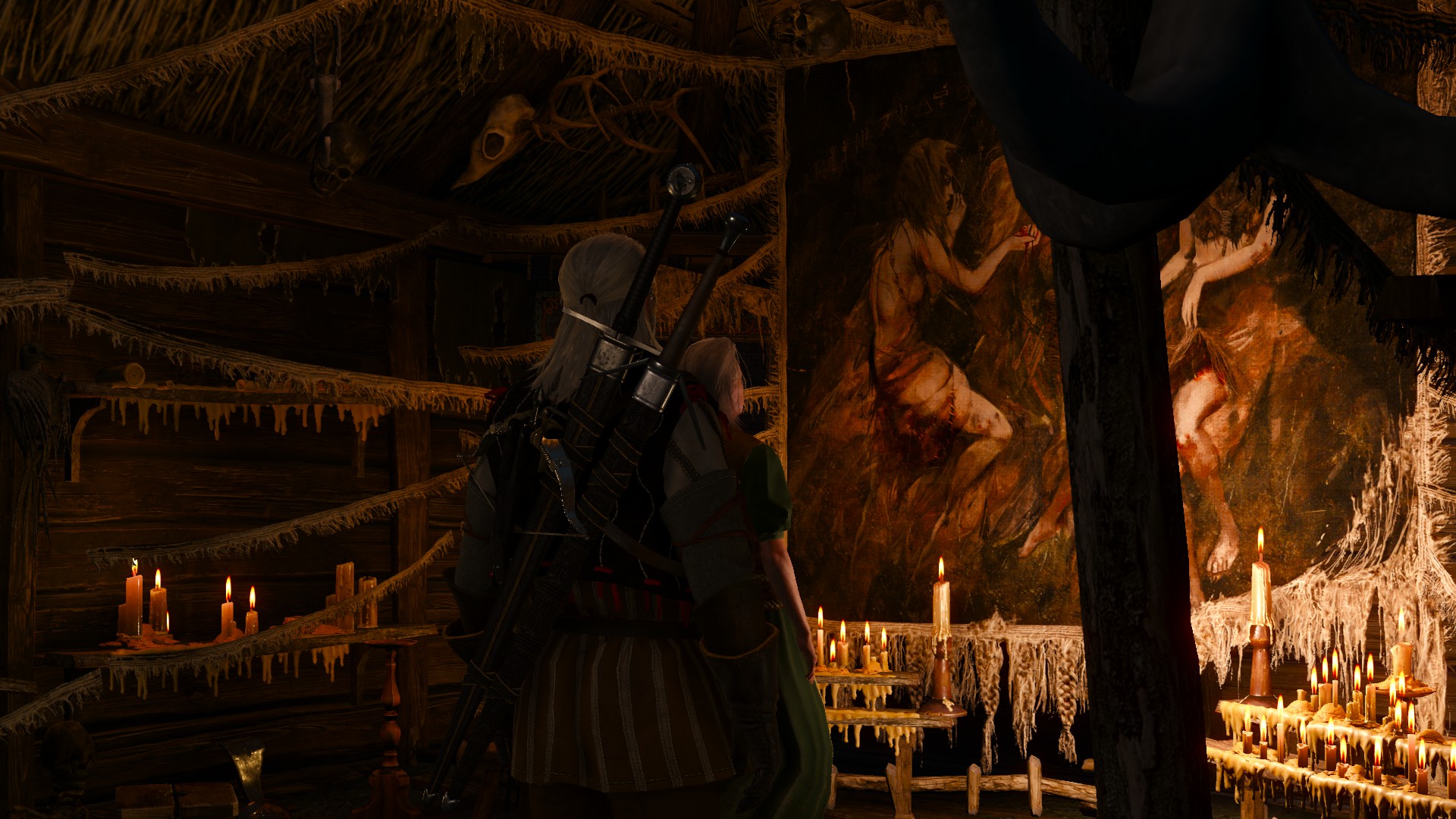
But this is only one layer of the artistry of the game. It's easy to point to technical features and concrete bits of media that are artistic, but the game's true success goes beyond that:
Emotion
Some people[who?]—shut up, wikipedia! I guess would say something is only art if it gets you to feel emotion. Whether or not that's true, perhaps it's easier to agree that playing on one's emotions is the sign of good art. And the breadth of emotion felt in TW3 certainly elevates it to that level. This would be impossible were it not for your engagement with the story and its characters, because you have to believe in those things, become invested in them, feel like they matter, if you are to feel anything about what happens to them.
Now, games are pretty good at getting you to feel some kinds of emotions: happiness and satisfaction, for example, at overcoming obstacles—or frustration at the opposite—are common and mundane. Laughter is fairly easy to produce through humour (which doesn't hinge on character attachment)—something which abounds in TW3. Let me digress in that direction a little:
Comedy is around every corner in this game. Geralt himself possesses a certain kind of dry wit, often arrogant, invariably sarcastic, that produces many a cackle. One quest sees you trying to lead a goat back to its owner by ringing a delightful little bell at it, whilst calling its name: "Princess." The whole scenario is ridiculous, as our hunk-of-mutated-man-meat protagonist walks through the forest tinkling this bell and crooning "Priinceeess!" But best of all is that Geralt knows it, and detests every minute. Until the end, when he seems to be forming a beautiful sort of bond with the animal.
Before this there is an encounter with an exquisitely proper chamberlain, who only addresses Geralt as, "the Gentleman" yet who seems to wield his politeness as a weapon to express his disdain. The feeling, of course, is mutual, expressed in turn by dripping sarcasm. Every troll expresses hilarious insights like, "Bart no minute got. Bart rocks got." Dijkstra's verbal swordplay with Geralt cuts just as well as the latter's blades, sarcasm that leaves me in stitches every time. (Dijkstra, incidentally, is another character voiced by an absolutely impeccable actor)
Later, you have the opportunity to get absolutely trolleyed with your fellow witcher buddies, and what follows is purest comedy gold, culminating (potentially) with one of your chums suggesting to call in some sorceress friends so they have some female company or, as he puts it, to "SUMMON THE BITCHES!" Funny enough, perhaps, for a tough, experienced monster-hunter to slur out words more suited to a freshers' party, but much more so since if any of the "bitches" in question heard him, he'd probably be spending the rest of his days with his body a little more dispersed and a little more crispy than is strictly ideal for remaining alive. All this jocularity manages to come with a keen human quality that sets aside from simple comedy: it's the realistic humour that happens between people who know each other well, care for each other, and are comfortable with one another.
This is what sets the humour of TW3 apart from mere jokes and funny lines: it's the kind of humour that I love Firefly for capturing so well—realistic and unforced, completely at home in spite of (or perhaps because of) the uncompromisingly cruel world. It doesn't end there, though. Because you feel such care for the other people in this story, you empathise with them, share their sorrows—such as in the case of the Baron. You feel anger at the Wild Hunt for trying to take Ciri, and occasionally you feel happiness, as when a fellow witcher can find a girlfriend and move away with her.
Revulsion is easy to evoke in a game, especially with modern graphics, but the developers seem to have a certain knack for the vile and disturbing. The botchling (in other words, just a casual demonic miscarried foetus), the Ladies of the Woods, the Pesta (and, potentially, her blood-curdling, repulsive kiss... eugh) are all awful, sickening, deliciously horrid.
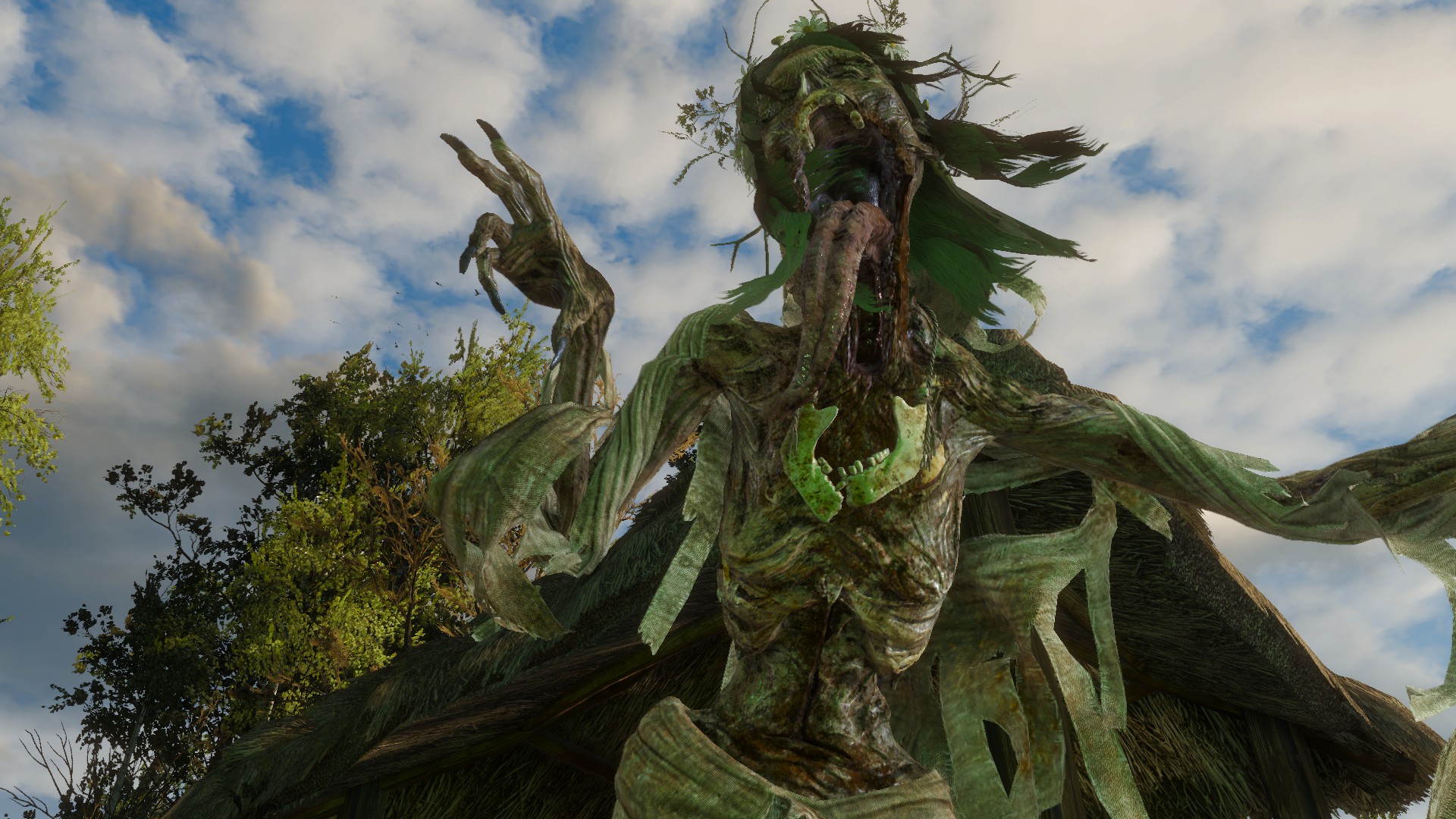
Perhaps one of the most forceful emotions is sadness. I love a good tragedy, and so much of the world of The Witcher is tragic. In a game where so many choices have no right option, you are faced with it frequently. Throughout the main quest we find sorrows great and small—the Baron's story has already been mentioned; turning down potential lovers results in heartfelt reactions to your rejection; Tomira's simple story of her fall-out with the Temple—all are poignantly rendered and acted.
Nowhere is this more evident than the ending. There is more than one ending, but all of them have some sadness to them; all brought tears to my eyes. One is perfectly bittersweet—a victory, yes, but also a loss of another kind. Another is almost harrowing, and ends with Geralt apparently waiting to die. After completing the game I watched all the endings on youtube. Somehow it seemed like they all happened, because they all could almost have followed on from my game. The sorrow of what might have happened is felt as keenly as the experience of what did happen.
Specifically, there are three endings, depending on how you treat Ciri in the latter part of the game. If you treat her poorly: being over-protective, not cheering her up, for example, then she will just die. The epilogue is Geralt returning to the remaining, living Crone, who stole Ciri's medallion. Upon retrieving this last memento of his adoptive daughter, he retreats to a cabin in Crookback bog, as monsters close in from all sides. It's horrifying! You spent over half the game looking for her, found her, managed to help her save the world and now... all you have left is this necklace. Geralt wants to die, and so do you.
Alternatively, if you treat her well, return with her to the Emperor, her real father, who then survives the war and political machinations, the epilogue consists of you two spending some beautiful father-daughter time together. Yet something is clearly getting at Ciri, and it's not long before you find out: she's been groomed to be the Empress, and your time together is cut short by a retinue come to ride with her back to her father. You may well never see each other again. If anything, the loss is even greater than if she'd died: it's absolutely, crushingly soul-wrenching.
Even the "good" ending jerks some tears, because the first scene after saving the world, you return to the Emperor's palace and tell him that Ciri is dead. There's no hint that you're actually lying until a few minutes later. Here was my reaction on IRC:
[02:21:10] <Fish-Face> wha
[02:21:15] <Fish-Face> I got the sad ending DDDDDD:
[02:22:18] <Fish-Face> I am pretty gutted
[02:26:44] <Fish-Face> AHHHHHHHHHHHHHHH
[02:26:47] <Fish-Face> FUCK YOU GAME
[02:26:50] <Fish-Face> OH MY FUCKING GOD
[02:26:53] <Fish-Face> DON'T DO THAT TO ME
[02:27:06] <Fish-Face> LIUHAGEILUHWRGLHE:OEWIJGHLIWEHG:OFIJEQLHBGQE
J:OIFELKGLHRW
I stand by that.
And then, with a deep intake of breath, I'm back in the real world. I've been sitting in the same position for too long, and it's far too late. Yet I can't sleep now; the events of the past few hours are still spinning in my mind—the victory and loss, joy and sorrow are still mingling and whirling there, along with all the other events and emotions from the play of the past few months. So I lie in bed and think about what an incredible experience it was and mourning—not so much for those fictional people whom I saw die, but for the end of the adventure: the journey which absorbed me for so many hours, drew me in, flung me round and spat me out again. This is its own bittersweet feeling: the story is over, but I wouldn't be wishing it weren't if it hadn't been so good.
